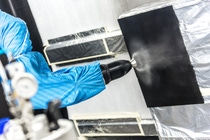Media
From transparency to reduction: CO2 and cost simulations in Automotive OEM Paintshop with BASF Coatings’ GLASS tool
- Paintshop responsible for more than 60 % of used energy in vehicle production at automotive factory
- Comprehensive life cycle analysis of ecological footprint of the paintshop
- GLASS tool enables optimization of cost, performance and ecological footprint
Reducing the ecological footprint towards CO2 neutrality is a significant goal for many industries and value chains, including the coating and pre-treatment processes of the automotive industry. Through its GLASS tool, BASF’s Coatings division offers an analysis approach that enables transparency and supports customers in making informed decisions for sustainable surface solutions.
GLASS stands for Global Life Cycle Assessment of Automotive Surface Solutions. It refers to the calculation and identification of environmental impacts such as CO2 emissions and associated costs. The analysis follows the cradle-to-grave approach, covering the entire value chain from raw material extraction via pre-treatment to clearcoat as the final step of the coating process. From this transparency customers can derive optimizations of costs, performance and their ecological footprint. The GLASS tool has been tested by an independent third party and fulfills the relevant components according to DIN EN ISO 14040 and 14044.
Transparency for product carbon footprint and paintshop
"A coating with its various layers of paint contributes approximately 30 kg of CO2 per manufactured vehicle. However, the actual application process has a much larger impact accounting for at least 150 kg of CO2 per vehicle, which makes approximately one third of the vehicle manufacturing process,” explained Sabrina Platzek, Vice President Global Marketing Automotive OEM Coatings. “Therefore, in addition to the product carbon footprint of the coating, it is important to make the footprint of the coating process in the paintshop transparent - as well as the energy consumption and related cost. Only with comprehensive data and simulation, it is possible to derive impactful measures. That is precisely what we can achieve for our customers with GLASS – and this provides an exceptional insight for the industry."
GLASS is based on an adapted lifecycle analysis model. It not only considers individual aspects of the paint application process, such as specific ovens or coating systems, but also allows BASF Coatings and the customer to analyze the environmental impacts of all essential components throughout the application process and across all layers in a modular approach. Regional and site-specific factors, such as local climate conditions, energy use, and customer-specific application processes or production structures are also considered. The modular structure of the model allows for consideration and analysis of specific aspects of interest or the entire painting line.
"Once transparency is established, we can provide targeted advice to our customers and develop solutions together. These can be CO2-reduced technologies at the beginning of the value chain or solutions that have a CO2-reducing effect when applied," said Tim Banik, Lifecycle Assessment Expert at BASF Coatings and developer of GLASS. "We aim to lead the way in sustainability in our industry. Therefore, it is at the center of all our actions. The positive feedback from the market proves that this is the right way. That is why in the long term we are looking forward to offering GLASS not only to the automotive OEM coatings industry, but also to other application areas," adds Dr. Markus Piepenbrink, Director Sustainability, BASF Coatings.
Compatible with BASF’s carbon footprint calculation method
All information on products assessed via BASF's CO2 footprint calculation method is available and usable in the GLASS tool of BASF Coatings. TÜV Rheinland has certified that BASF's calculation method and reporting of the cradle-to-gate Product Carbon Footprints fully comply with the requirements of the Greenhouse Gas Protocol, relevant ISO standards as well as Together for Sustainability (TfS), as the pioneering chemical industry alliance.
For more information on GLASS and sustainability at BASF Coatings, please visit: www.basf-coatings.com/sustainability.
About BASF’s Coatings division
The Coatings division of BASF is a global expert in the development, production and marketing of innovative and sustainable automotive OEM and refinish coatings, decorative paints as well as applied surface treatments for metal, plastic and glass substrates in a wide range of industries. This portfolio is supplemented by "Beyond Paint Solutions", which enable new applications with innovative surfaces. We create advanced performance solutions and drive performance, design and new applications to meet our partners’ needs all over the world. BASF shares skills, knowledge and resources of interdisciplinary and global teams for the benefit of customers by operating a collaborative network of sites in Europe, North America, South America and Asia Pacific. In 2022, the Coatings division achieved global sales of about €4.2 billion.
Solutions beyond your imagination – Coatings by BASF. For more information about the Coatings division of BASF and its products, visit www.basf-coatings.com.
About BASF
At BASF, we create chemistry for a sustainable future. We combine economic success with environmental protection and social responsibility. More than 111,000 employees in the BASF Group contribute to the success of our customers in nearly all sectors and almost every country in the world. Our portfolio comprises six segments: Chemicals, Materials, Industrial Solutions, Surface Technologies, Nutrition & Care and Agricultural Solutions. BASF generated sales of €87.3 billion in 2022. BASF shares are traded on the stock exchange in Frankfurt (BAS) and as American Depositary Receipts (BASFY) in the United States. Further information at www.basf.com.
P-24-120



